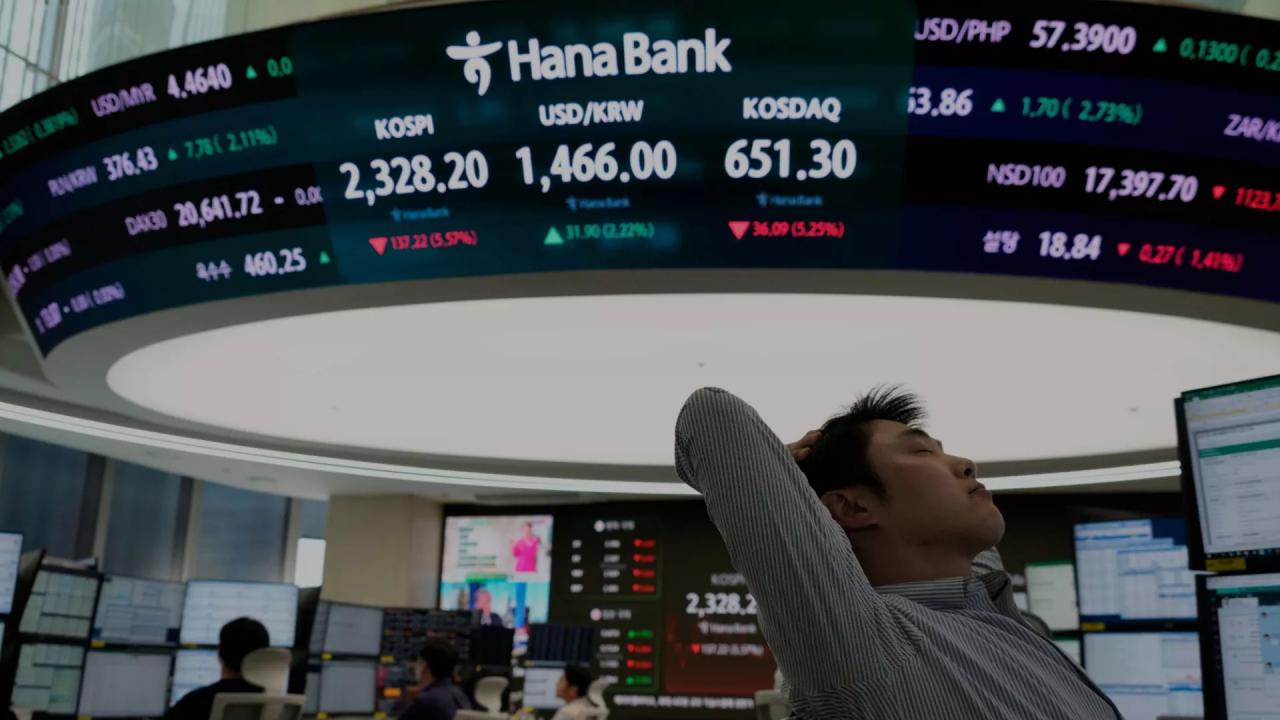
In Asia, the Tokyo stock market plunged 7.8%, Seoul lost 5.6% and Sydney 4.2%, while Hong Kong fell nearly 13% during the session, a record since October 2008, during the global financial crisis.
Stock markets in Asia and Europe plummeted on Monday due to fears that the trade war could trigger a full-scale recession, triggered by US tariffs on its trading partners.
Brent crude oil, moreover, fell 2.25% on the London market and, in just three sessions, has accumulated a decline of almost 15%, reaching its lowest level in the last four years, due to the impact of the tariffs imposed by United States President Donald Trump on the rest of the world.
BLACK MONDAY ON THE STOCK MARKETS DUE TO FEARS OF A GLOBAL RECESSION
In Asia, the Tokyo stock market plunged 7.8%, Seoul lost 5.6% and Sydney 4.2%, while Hong Kong fell nearly 13% during the session, a record since October 2008, during the global financial crisis.
In Europe, the major indices opened in free fall, following the same path as the Asian markets.
Frankfurt fell 7.86% after briefly posting losses of more than 10%. Paris opened down 6.19%, London down 5.83%, Madrid down 3.6%, and Milan down 2.32%.
Brent falls nearly 15% in three sessions and is at its lowest level in four years.
The price of a barrel of Brent crude oil fell 2.25% on the London market on Monday, and in just three sessions, it has accumulated a decline of nearly 15%, reaching its lowest level in four years.
North Sea crude, the European benchmark, was trading at US$64.10, down 2.25% from Friday's close, and remains well below the US$70 mark.
Black gold continued its downward trend following the collapse in Asian markets, which were hardest hit by the additional tariffs imposed by Trump last week.
The crisis has deepened after the Chinese government decided to impose a 34% tax on goods imported from the US as a retaliatory measure.
Beijing's decision will take effect on April 10.
The Taipei Stock Exchange's benchmark index, the Taiex, suffered its biggest daily drop in history on Monday, amid investor panic following tariffs on Taiwanese products.
In London, after the opening bell, the stock market fell 5.68% today, but by mid-morning the drop was smaller—although still very high—falling 4.09%, due to the continued impact of Trump's measures, which experts say could trigger a recession.
FEAR OF LARGE-SCALE RECESSION
Hopes that Trump would reconsider his policy faded Sunday when he said he wouldn't reach a deal unless trade deficits were resolved first.
“Sometimes you have to take medicine to fix something,” he said aboard Air Force One.
In Asian markets, all stocks were affected, from technology to automobiles, banks, casinos, and energy companies.
Among the biggest losers are large Chinese technology companies such as Alibaba, which lost more than 17%, and its rival JD.com (14%).
"We could very quickly see a recession in the United States, and it could last about a year, quite protracted," said Steve Cochrane, chief economist for Asia and the Pacific at Moody's Analytics.
Copper, a vital component for energy storage, electric vehicles, solar panels, and wind turbines, also saw its losses widen.
Futures for the Dow Jones and S&P 500 in the United States also point to steep losses like those seen last Friday.
“So far, the Trump team isn't backing down… It's clear that Washington is using the market difficulties as leverage to negotiate, rather than as a signal encouraging them to change course,” said Stephen Innes of SPI Asset Management.
GOLDMAN SACHS RAISES PROBABILITY OF U.S. RECESSION TO 45%
The American bank Goldman Sachs has revised its growth expectations for the United States economy downward; it has also raised the risk of a recession for the country to 45%, from a 35% probability prior to Liberation Day.
"The combination of higher tariffs, greater political uncertainty, declining business and consumer confidence, and messages from the Administration indicating a greater willingness to tolerate short-term economic weakness in its policy implementation increase the downside risk," summarizes the influential Wall Street entity.
In this regard, the entity notes that greater political uncertainty and tighter financial conditions have reduced the average expectation of capital spending growth over the next year and "increased the probability of negative growth from 15% in the third quarter of 2024 to the current 45%.
Goldman Sachs thus joins other leading firms that, following Donald Trump's announcement, have raised the risk of a recession in the United States, after JPMorgan Chase indicated a 60% probability of a recession last week.
Likewise, while S&P Global does not expect a recession as defined by the NBER (National Bureau of Economic Research) in the next 12 months, the agency does admit that the subjective probability of one occurring "has likely increased from 25% in March to 30%-35%."










